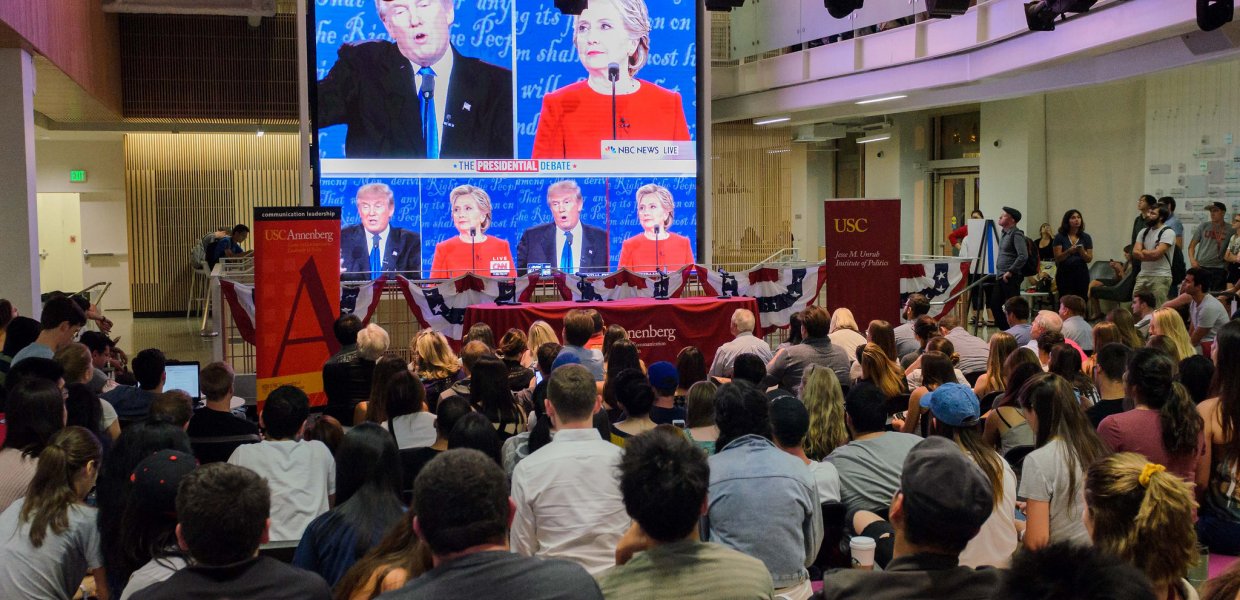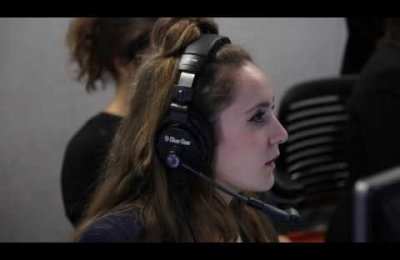A crowd of over 850 filled multiple floors of Wallis Annenberg Hall on Monday, September 26, with USC students, faculty, and staff gathering around the media wall for a panel discussion and viewing of the much-anticipated first presidential debate between Hillary Clinton and Donald Trump.
Organized by the USC Annenberg Center on Communication, Leadership and Policy (CCLP) and the USC Dornsife Jesse M. Unruh Institute of Politics, the event drew an enthusiastic crowd eager to witness one of the most important milestones in the election.
“The first debate is remarkably powerful in informing voter attitudes,” said Gordon Stables, Assistant Dean of the USC Annenberg School for Communication and Journalism, who moderated the panel discussion which preceded the televised debate.
“This is the first moment where the two candidates appear on stage, near each other, be responsive to each other, and be engaging each other,” Stables said.
Joining Stables for the panel were Antonia Hernandez, president and CEO of the California Community Foundation and board member of the Commission on Presidential Debates, and Judy Muller, award-winning journalist and Professor of Journalism at USC Annenberg.
Hernandez began by stressing that millennials, including the students in the audience, make up an important segment of the voting population.
“It is really important for the millennials to show up and vote. It's a very large generation, and, as the future leadership of our country, it's important that they express their perspective,” Hernandez said.
Muller said anticipation for this debate has been greater than for any other political event in recent history.
“This is the first female candidate for president up against the first reality show candidate,” Muller said. "It's going to be a show—in terms of viewers it may be the biggest in the history of television."
Stables noted that the audience at the event was “disproportionately most likely Clinton-leaning or Democratic-leaning,” which was evident during the debate, where Clinton's remarks on key issues were met with applause, while Trump's were often met with groans or laughter.
Despite that partisan divide, Stables said Clinton is still underperforming with millennials. When he asked the panel what the candidates could do to reach the key demographic, Muller said that they would need to be aware of the role of social media in the election.
“We now live in a world where social media is going to be judging this in real time,” Muller said. “If [the candidates] are smart, they'll know that.”
Hernandez stressed that voters should be wary of how the media shapes the narratives surrounding each candidate, and should watch the debates to form their own opinions about the candidates.
“What you get is a filtered view based not only on what you saw, but the way that it's been spinned,” Hernandez said. “So the question is not what the candidates are going do—the question is what are the voters gonna do [...] because at the end of the day these two candidates cannot do a single thing. It is the voter who must go beyond their own preconceived notion and listen.”
After the debate, Harice Nguyen (M.S. International Public Policy '16), said that watching with a large audience gave the proceedings an air of mass entertainment. “I really enjoyed it, it felt like a reality drama,” she said, echoing Muller’s earlier remarks.
Nguyen, who is an international student from Vietnam, also noted that the presentation of politics in America contrasted heavily with how issues are framed in her home country. “It's very interesting to me—politics is totally different in America,” she said. “[Here] people are able to face the truth and show their opinion, like the way Hillary presented tonight—it was really professional. I feel like she won this debate.”
Nathaniel Haas (B.S. Political Science and Economics '12; J.D. '18), who describes himself as a strong supporter of Hillary Clinton, has been watching the presidential debates at USC Annenberg since he was a freshman.
“I watched the Obama-Romney debates in the old Annenberg building when Wallis Annenberg Hall wasn't even built yet,” Haas said. “Gordon Stables was actually my debate coach when I was an undergrad. He always has good things to say, and I just wanted to be in the room for this.”
As for the debate itself, Haas said Clinton “exceeded my expectations. I think she performed at her best, and I think Donald Trump performed worse than his worst.”
CCLP and the Jesse M. Unruh Institute of Politics will be hosting viewing events at Wallis Annenberg Hall for two more upcoming debates this fall: the vice presidential debate on October 4 and the presidential debate on October 19.









